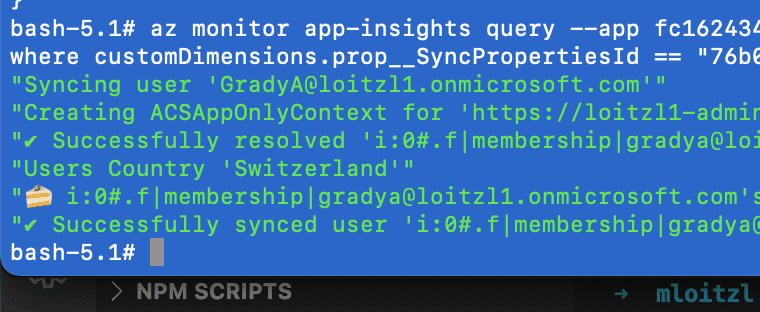Objective
Besides the Azure Insights user interface in the Azure Portal before there is also an Azure CLI extension for retrieving and querying Azure Insights data.
This article describes a way how to retrieve that data in a background job or daemon application.
Authentication Options
There are several ways to authenticate the Azure CLI using az login.
Interactive Login
If the login request is from a computer with a browser, a login window will automatically pop-up.
When the cli is running in a container or remote ssh session Azure CLI will automatically fall back to device authentication:
$ docker run -v ${PWD}:/workspace -it mcr.microsoft.com/azure-cli
[Container starts]
bash-5.1# az login
To sign in, use a web browser to open the page https://microsoft.com/devicelogin and enter the code AABBCCDD5 to authenticate.
[Sign In in Browser]
[
{
"cloudName": "AzureCloud",
[..]
"name": "Visual Studio Ultimate mit MSDN",
"state": "Enabled",
"tenantId": "0a7ab993-afa3-4a29-9b0b-f64583a4d888",
[..]
}
]
bash-5.1# Automated Login
For automation purposes it can be necessary to authenticate within azure cli using a client secret…
$ az login \
--service-principal -u c4fe6c64-4e6a-4997-9a4f-7d96b30dfb51 \ # App Id
-p iNr....GaaNE \ # Client Secret
--tenant 0a7ab993-afa3-4a29-9b0b-f64583a4d888 # Tenant id or name…or with a client certificate in pem format:
$ az login \
--service-principal -u c4fe6c64-4e6a-4997-9a4f-7d96b30dfb51 \ # App Id
-p ClientCert.pem \ # Client Certificate
--tenant 0a7ab993-afa3-4a29-9b0b-f64583a4d888 # Tenant id or nameInformation on how to obtain a certificate in pem format using openssl can be found here
Find the Azure Insights Resource
Now we can try to find the correct azure insights resource.
With az group list resource groups where the service principal has access can be listed.
$ az group list
{ [..] },
{
"id": "/subscriptions/4664bbed-abef-4e8b-bd4a-462f757c712c/resourceGroups/rg-dev",
"location": "switzerlandnorth",
"managedBy": null,
"name": "dev",
"properties": {
"provisioningState": "Succeeded"
},
"tags": null,
"type": "Microsoft.Resources/resourceGroups"
}
{ [..] },
{ [..] }When the resource group name is known we can list the contents of a resource group using az resource list
$ az resource list \
--resource-group rg-dev \ # the resource group from the previous step
--resource-type Microsoft.Insights/components # azure insights type
[
{
"changedTime": "2022-02-24T10:17:15.282736+00:00",
"createdTime": "2022-02-24T10:07:14.668422+00:00",
"extendedLocation": null,
"id": "/subscriptions/4664bbed-abef-4e8b-bd4a-462f757c712c/resourceGroups/rg-dev/providers/Microsoft.Insights/components/dev",
"identity": null,
"kind": "web",
"location": "switzerlandnorth",
"managedBy": null,
"name": "dev",
"plan": null,
"properties": null,
"provisioningState": "Succeeded",
"resourceGroup": "rg-dev",
"sku": null,
"tags": {},
"type": "Microsoft.Insights/components"
}
]The value of the id can be used to retrieve monitoring events.
Retrieving Events
Using az monitor app-insights events we can now retrieve events from Azure Insights by passing the id retrieved in the previous step as the --app parameter.
$ az monitor app-insights events show \
--app /subscriptions/4664bbed-abef-4e8b-bd4a-462f757c712c/resourceGroups/rg-dev/providers/Microsoft.Insights/components/dev \
--type traces \
--offset 24hSetting the --offset parameter will retrieve application traces within the last 24 hours.
{[..]},
{
"ai": {
"appName": "dev",
"sdkVersion": "azurefunctions: 3.5.2.0",
[..]
},
"application": {[..]},
"client": {
[..],
"type": "PC"
},
"cloud": {
"roleInstance": "...",
"roleName": "dev"
},
"count": 1,
"customDimensions": { [..] },
"customMeasurements": null,
"id": "dbf73851-ba43-11ec-a27c-af008d3d954f",
"operation": {
"name": "PeopleSyncJob",
"parentId": "2bd1380092e0fd47",
[..]
},
"session": {
"id": ""
},
"timestamp": "2022-04-12T09:35:02.767000+00:00",
"trace": {
"message": "🍰 i:0#.f|membership|gradya@loitzl1.onmicrosoft.com's Birthday: '3/8/2000 12:00:00 AM'",
"severityLevel": 0
},
"type": "trace",
"user": {[..]}
}
{[..]},
{[..]}The field trace.message contains the custom log entry we might be interested in.
Executing Analytics Queries
It is also possible to run kusto queries within Azure CLI using az monitor app-insights query
$ az monitor app-insights query \
--app fc162434-7ef9-4d1c-a9d7-3ac820c38800 \
--offset 24h \
--analytics-query 'traces | search "*grady*"'This returns a json table structure
{
"tables": [
{
"columns": [..],
"name": "PrimaryResult",
"rows": [..]
}
]
}where columns contains a description of the row’s data,
{
"columns": [
{
"name": "$table",
"type": "string"
},
{
"name": "timestamp",
"type": "datetime"
},
{
"name": "message",
"type": "string"
},
[...]and rows contains the actual data:
[
"traces",
"2022-04-11T16:00:02.770299Z",
"🍰 i:0#.f|membership|gradya@loitzl1.onmicrosoft.com's Birthday: '3/8/2000 12:00:00 AM'",
[..]Correlate Log entries
If we have something that can be used to correlate log entries over one request or operation, a full trace can be retrieved like this:
$ az monitor app-insights query \
--app fc162434-7ef9-4d1c-a9d7-3ac820c38800 \
--offset 24h \
--analytics-query 'traces | where customDimensions.prop__SyncPropertiesId == "76b036f3-3083-4472-8958-171c46fb8e02"'together with the magic of jq we can transform the result into a complete trace of a certain operation:
$ ... | jq '.tables[0] | .rows | .[][1]'"Syncing user 'GradyA@loitzl1.onmicrosoft.com'"
"Creating ACSAppOnlyContext for 'https://loitzl1-admin.sharepoint.com' and 'eca24dc1-1e18-4ed0-94b7-f9c269caf540'"
"✔ Successfully resolved 'i:0#.f|membership|gradya@loitzl1.onmicrosoft.com'"
"Users Country 'Switzerland'"
"🍰 i:0#.f|membership|gradya@loitzl1.onmicrosoft.com's Birthday: '3/8/2000 12:00:00 AM'"
"✔ Successfully synced user 'i:0#.f|membership|gradya@loitzl1.onmicrosoft.com'"Outlook
Being able to retrieve and analyze Azure Insights data as a daemon app brings interesting opportunities for log analytics and alerting.
It could also be used for higher level integration testing in projects with a low level of testability.
